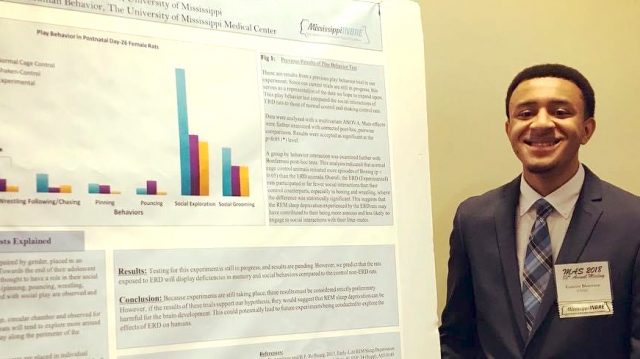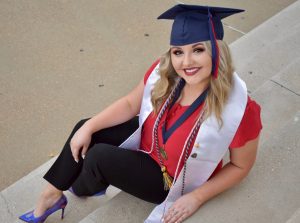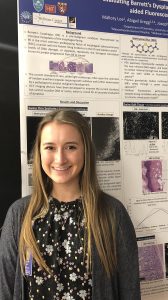
Connor Bluntson exhibits some of his undergraduate research at the Mississippi Academy of Sciences. The first-year medical student became acquainted with some of the work being conducted at the UM Medical Center during his freshman year at Ole Miss. Submitted photo
OXFORD, Miss. – This summer, 104 members of the University of Mississippi class of 2020 are entering medical school during a historic time, a global pandemic of COVID-19.
Because of safety protocols, they’re missing out on milestone events, such as the traditional white coat ceremony, when new medical students get a white coat and recite the Hippocratic Oath, signifying their entrance into the medical profession.
Yet, their education moves onward. Through all the intensity that the first weeks of medical school brings, these fledgling medical students are aware that they have a front seat to the challenges and advances in health care that are front page news.
Here are the journeys of three.
Connor Bluntson, UM School of Medicine
Connor Bluntson’s emergence into medical school has been a quick plunge.
“First two tests yesterday (Aug. 19) and I pretty much collapsed into bed as soon as I got home!” he said.
“Starting medical school during a pandemic has been quite the unique experience. The format of many of our classes is changing or going virtual; it has made an already difficult year of transition even more challenging.”
His first experience at University of Mississippi Medical Center came after his freshman year at Ole Miss, when he researched the effects of sleep deprivation on early-life development, shadowing Dr. James Shaffery, director of the Animal Behavior Core Facility in the Medical Center’s Division of Neurobiology and Behavioral Research, a part of the Department of Psychiatry and Human Behavior.
As a biology major with a pre-med emphasis, he found guidance for his passage through academia in the Minority Association of Pre-Medical Students. Based in the Health Professions Advising Office, MAPS is a nationally recognized organization open to all undergraduate minority students who are headed for a career as a health professional.
In the summer of his junior year, the association opened the door to a six-week summer health professions preparation program at the College of Physicians and Surgeons, the medical school of Columbia University.
Perhaps most important of all, it was through MAPS that Bluntson met his mentor, Khalid Manzoul (BS 18), now a third-year medical student at the Medical Center. Two years apart in school, the two first met at Ridgeland High School and were reunited through MAPS.
“It’s a different journey to be a pre-med as a minority person,” Bluntson said. “MAPS would bring in minority doctors to talk to us so we would have role models. MAPS students take other students of color under their wing and support them.”
Recalling his introductory science courses at UM, he said, “It really helps when you walk into a large lecture hall and see other minority students there. We would study together and support each other.”
Manzoul, was invaluable when Bluntson was studying for the Medical College Admission Test last summer.
“I dedicated a good month-and-a-half to study,” he said. “Khalid passed down his MCAT prep books to me. I knew these books had worked for him, so they should work for me, too, in scoring high on a very difficult test.”
The magic worked. Bluntson’s first year at UMMC aims for a foundation that balances academics and clinical work. His first-year courses include Biochemistry, Histology and Cell Biology, Gross Anatomy, Physiology, Developmental Anatomy and Neurobiology.
During his second semester, he will ease into patient care with Core Concepts, a course that is a gradual introduction to the clinical aspect of medicine. It includes a basic life-support class, guest lecturers, group projects and the students’ first patient interaction.
“I feel fortunate to begin my medical journey now in a time where health care professionals have never been more crucial to the framework of our society,” he said. “It helps to put my studies in perspective knowing that I’ll soon be able to make a similar impact in my own community, and hopefully, help to prevent a similar disaster from occurring in the future.”
Joey Madison Davis, UM School of Medicine

Joey Davis settled on a career in medicine when she landed an internship after her freshman year at UM shadowing doctors in the emergency room at St. Francis Hospital in Memphis. Submitted photo
Joey Davis and Bluntson are in the same cohort. On her first day of orientation at the School of Medicine, Davis (BS 20) recalled the first phone call she made after she learned that she’d been accepted into medical school.
“I called Dr. Taylor and Ms. Kelli,” she said. “Dr. Taylor put me on speakerphone so that I could tell them both at the same time.”
Sovent Taylor and Kelli Hutchens – respectively, the director and assistant director of the university’s Health Professions Advising Office – had mentored Davis since her sophomore year at Ole Miss.
“I started out in the School of Pharmacy, but it wasn’t really the right match, so I went to speak to Ms. Kelli, and she helped me get an internship shadowing doctors in the emergency room at St. Francis Hospital in Memphis,” she said. “That’s when I knew I wanted to be a physician.”
At St. Francis, Davis started out shadowing physicians the summer of her freshman year. By April of her sophomore year, she was hired to a full-time position as a scribe for the ER doctors.
“A scribe takes notes for the doctors when they’re examining the ER patients,” Davis said.
While she worked at St. Francis, she also maintained a full course load at UM and – in her free time – worked in the Department of Chemistry and Biochemistry as a group study leader.
Her most memorable moments at St. Francis were seeing how some patients put the doctors trying to help them “under scrutiny for their ethnicity, race and gender.”
“I saw female doctors who didn’t get respect and African American doctors whose patients wouldn’t let the doctors touch them, but the doctors always handled the situation with complete professionalism,” Davis said. “I saw how they always maintained respect for the patients.”
Davis said that Taylor and Hutchens helped her articulate these experiences in essays she wrote for her medical school applications. They also supported her application process by helping her get a scholarship to pay for online tutoring for the notoriously difficult Medical College Admission Test.
Taylor had created a scholarship program with funding from large test-preparation companies, such as Kaplan and Altius, to help ensure that the steep price wasn’t an obstacle to students’ excelling on the test.
“It was about $3,000 worth of materials, including the practice test books and online practice sets,” Davis said. “I’m the first generation in my family to attend college, and that would have been unaffordable for me.”
During her junior year, she split her time between her job at St. Francis and a job at the Health Professions Advising Office on campus. By her senior year, she worked full-time at the campus office.
“I was always there anyway, so working there wasn’t much different,” she said.
She chose UMMC for its small size. As she begins her education there during the pandemic, she feels that the unusual circumstances add “another layer of meaning.”
“We’re going to be obtaining knowledge as we go, just like the rest of the medical world,” she said. “It’s clear that I’m passionate about being a physician.”
Mallory Loe, Tulane University School of Medicine

Mallory Loe, a graduate of the UM Sally McDonnell Barksdale Honors College, completed a research fellowship with the HST-Wellman Summer Institute for Biomedical Optics. Submitted photo
Mallory Loe found her inspiration to become a doctor under her own roof growing up. Her little sister was born with a congenital heart defect just eight days after Hurricane Katrina and had to be airlifted from the local hospital in West Monroe, Louisiana, to a medical center in New Orleans with the ability to perform cardiac surgery on newborns.
Years later, that initial fascination with medicine led Loe to the HST-Wellman Summer Institute for Biomedical Optics, a collaboration between Harvard University and the Massachusetts Institute of Technology. Each summer, the institute chooses 8-12 undergraduate students from across the country to pursue full-time laboratory research for 10 weeks.
The fellowship funded Loe’s summer research at a lab in Massachusetts General Hospital, run by Guillarmo “Gary” Tearney, the Remondi Family Endowed MGH Research Institute Chair, professor of pathology at Harvard Medical School and an affiliated faculty member of the Harvard-MIT Division of Health Sciences and Technology.
At the lab, Loe was part of a research team that leads the medical field in using high-resolution optical imaging modalities to diagnose disease rather than taking tissue samples for biopsies. Doctors can get a good look at a part of the body and develop a diagnosis without an invasive procedure.
She found the fellowship with Tearney after meeting him during her Junior Quest, a program sponsored by the Sally McDonnell Barksdale Honors College.
In December 2018, several Honors College juniors traveled to Boston to interview professionals in their fields of interest and to gather information for their honors theses. During the trip, Loe visited Tearney, whom she had researched and asked for an appointment. After they met, he suggested that she apply for the HST-Wellman Summer Institute.
“I love research and discussion about medical topics, and I was interested in doing research that could have a direct benefit to so many patients,” Loe said. “It was an incredible opportunity.”
Loe is continuing her journey at the Tulane University School of Medicine, which she entered this summer.